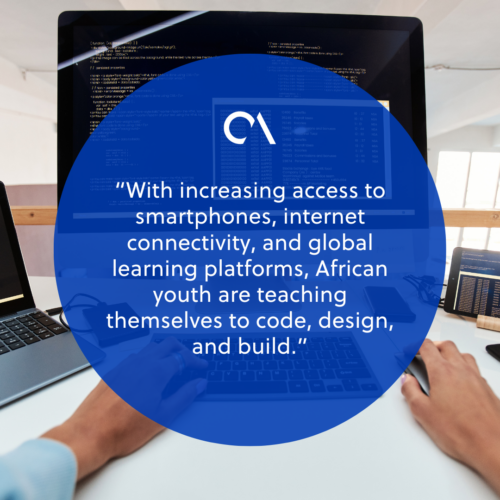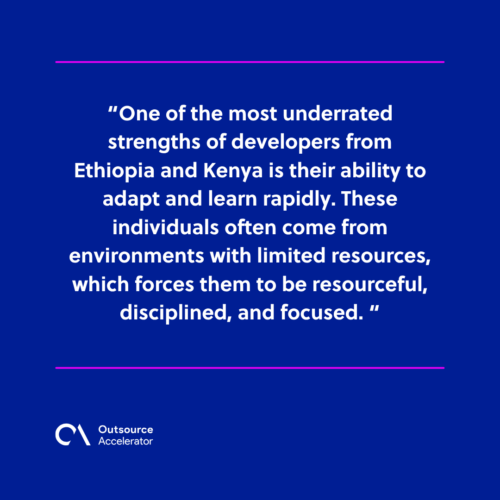Why Ethiopia and Kenya are the next hotspots for software development outsourcing in Africa

If you’re building software, you know the drill: scale demands smart choices. Historically, that often meant looking to established giants in India or the Philippines.
But the global tech map is getting a radical redraw. East Africa, specifically the burgeoning digital economies of Ethiopia and Kenya, is not just rising; it’s bursting onto the scene as the next major hotspot for software development outsourcing.
Imagine accessing a fresh wave of talent, powered by improving infrastructure and a hunger for global collaboration. That’s the compelling proposition these countries offer businesses seeking a genuine competitive edge.
In the 547th episode of the Outsource Accelerator Podcast, Simon Sällström, CEO of Tison, speaks on the workforce he champions.
As he puts it: “There are many young people in Kenya and Ethiopia whose families live on less than $300 per month. Despite stellar grades, they just couldn’t afford a laptop or university.”
With training, Tison has been able to develop them into “world-class talents.”
This article examines the potential of Ethiopia and Kenya for software development outsourcing.
The global outsourcing landscape
For years, companies have turned to outsourcing as a way to reduce costs, access talent, and remain agile. India, the Philippines, and Eastern Europe have become go-to markets for software development outsourcing.
These regions offer mature ecosystems, established infrastructure, and deep talent pools. But they are also facing saturation.
Salaries are rising. Competition for talent is fierce. And retention is becoming a growing concern.
This has prompted many forward-thinking companies to look elsewhere. They’re not just chasing cost-efficiency anymore—they want quality, scalability, and impact. That’s where Africa enters the picture.
Why outsource software development to Africa?
Africa is young, with over 70% of its population under the age of 30. This youth bulge brings tremendous potential—especially in tech.
With increasing access to smartphones, internet connectivity, and global learning platforms, African youth are teaching themselves to code, design, and build.
Simon explains it clearly: “The infrastructure was there, but the business model didn’t exist. Kenya now has, in Nairobi, better 4G or 5G than what I have in London.”
But there were no accessible pathways for the talent to succeed in tech. Now, government initiatives across the continent are accelerating the shift.

In Kenya, the tech industry is booming. Global companies like Google and Microsoft have already opened development hubs in Nairobi. Ethiopia, once closed off, has begun liberalizing its telecom and digital markets—unlocking one of the largest untapped labor forces on the continent.
As Simon points out: “Ethiopia was recently opening up their economy. With over 120 million people and very low income levels, the gap between what is and what could be is among the greatest.”
Benefits of outsourcing software development to Ethiopia and Kenya
Outsourcing to Ethiopia and Kenya offers distinct advantages that go beyond just lower costs.
1. Untapped talent
Unlike crowded outsourcing markets, Ethiopia and Kenya offer access to brilliant minds who haven’t yet been discovered.
Tison, for example, focuses on identifying the top 0.1% of talent in these countries. These are youth with exceptional cognitive abilities, raw intelligence, and the grit to learn fast.
“We started an academy to find and train the absolute brightest young people… We found students with almost no prior experience in development, but today they’re working for US and UK companies,” says Simon.
2. Cost-effective without compromising quality
Hiring developers from Ethiopia or Kenya can be significantly cheaper than from more saturated markets. But that doesn’t mean settling for less.
With proper training, mentorship, and structure, these developers can deliver excellent work.
“The best Indians are excellent, but they’re now at market price. Kenya and Ethiopia still offer developers who are in the top 5% of their university at a price where you’d otherwise get a ‘pretty okay’ developer,” Simon explains.
3. Cultural and linguistic alignment
Kenya’s official language is English. Ethiopia is increasingly integrating English into higher education and tech circles, meaning communication barriers are minimal.
Developers are also trained in soft skills, project management tools, and Agile practices.
Tison places a heavy focus on soft skills—standups, sprints, using Git, oral exams, and presenting work just like they would in any Western tech company.
4. Impact-driven outsourcing
For companies that care about social impact, outsourcing to Africa isn’t just good business—it’s transformative. It helps lift families out of poverty and strengthens local economies.
“We charge nothing upfront. But once they get into a high-paying job, they pay it forward. It’s outcome-based tuition,” Simon shares.
5. Rapid learning and resilience
One of the most underrated strengths of developers from Ethiopia and Kenya is their ability to adapt and learn rapidly. These individuals often come from environments with limited resources, which forces them to be resourceful, disciplined, and focused.
When given access to structured training and mentorship, their growth trajectory is impressive.
Simon highlights this with a powerful example: “Bewton, one of our students, had no experience two years ago. Today, he’s led three different projects with clients in the UK and Europe, managing product requirements, deployments, and even team coordination.”
This kind of accelerated learning, backed by a strong work ethic, makes these developers stand out. They aren’t just technically competent—they’re highly motivated. They don’t take opportunities for granted, which shows in their dedication and performance.
For companies seeking long-term collaborators who will grow fast and contribute meaningfully, developers from Ethiopia and Kenya are a smart investment.

Challenges and solutions in software development outsourcing
Outsourcing anywhere comes with risks. Africa is no exception. But the challenges in Ethiopia and Kenya are being addressed swiftly.
1. Connectivity and infrastructure gaps
While urban areas have strong connectivity, rural regions still lag. Tison overcomes this by lending laptops and covering mobile data costs during training.
“We lend them a laptop and give them data. That small support changes everything,” says Simon.
2. Lack of awareness about global opportunities
Many young Africans don’t even know they can work for international companies remotely.
Organizations like Tison bridge this knowledge gap. Their developers now work with many early-stage startup founders across the US and Europe.
3. Trust and quality assurance
Some companies hesitate to work with junior developers from unfamiliar regions. Tison’s model of managed internship teams solves this. Juniors work under senior engineers and international tech leads, ensuring quality delivery.
“Companies want results. We provide those through managed teams—so you don’t deal with the handholding, we do,” Simon says.
Ethiopia and Kenya are no longer hidden gems—they’re rising stars in software development outsourcing.
Their blend of young talent, improving infrastructure, and innovative training models make them ideal destinations for companies that want to scale smartly and make a difference.
The next tech unicorn might just be built by a team in Nairobi or Addis Ababa. If you’re looking for a new frontier in outsourcing, East Africa is calling. And it’s ready.
In line with Tison’s aim of providing career opportunities to underserved communities, you can also see other organizations’ impactful initiatives through the Outsourcing Impact Review! Learn more about how outsourcing can become a powerful tool for positive change. Nominate now!






 Independent
Independent




